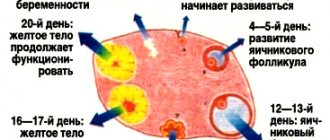Delayed periods in teenagers
Puberty in girls occurs from approximately 13 to 15 years. Why are periods delayed in 14-year-old girls, and what could be the reason for the delay? During this period, hormonal levels and physical development change, girls begin their menstrual cycle and you should not worry if the cycle is unstable for one or two years. This is natural for a teenage body. There are many factors that can affect hormonal levels. But if, after this time, a 14-year-old teenager continues to have a delay in menstruation, it is worth contacting a pediatric gynecologist.
The menstrual cycle is a cyclical phenomenon that occurs throughout almost the entire life of a girl’s reproductive organs. This phenomenon is characterized by bleeding every 27–30 days. After graduation, an adult woman enters menopause. And from that moment on she cannot get pregnant.
Each teenager begins menstruation at a different age. For some, it begins at age 11, for others at 14. The brain regulates changes associated with menstruation. It is capable of transmitting nerve impulses to the pituitary gland and hypothalamus. The menstrual cycle can last from 22 to 34 days. It is necessary to count from the first day of your period to the first day of the next one.
Reasons for missed periods at 13 years old
This article is intended to answer the question of why there are no periods at the age of 13. First of all, it is worth dividing our article into two parts: in the first we will explain what to do if by this age they have not yet appeared even once, and in the second we will deal with the problem of a delay in the period following the first. It is worth understanding, however, that neither the first nor the second case is a reason to panic. To determine whether you are dealing with normality or pathology, it is worth learning about the characteristics of the body in more detail. Firstly, if the first menstruation did not occur until the age of 13, this may indicate that the development of the girl’s reproductive system is slightly, but not critically, delayed. In medical practice, it is customary to call the first menstruation that occurs at the age of more than 13 years “late.” There are several reasons for this phenomenon:
- Heredity. Often, when many women in a family talk about menstruation, there is a high probability that the youngest representative will experience it at the age of 13–15. If such a pattern is observed, then in most cases there is no reason to worry about the late onset of menstruation.
- Underweight or low physical activity. Girls who eat well and do physical exercise go through puberty earlier than their peers. Also, sudden weight loss or gain can undermine the overall health of the body, and therefore the endocrine system, which will lead to “late” menstruation.
- Unstable emotional state, overwork, stress. The so-called stress hormones, adrenaline and norepinephrine (their release occurs in moments of emotional upheaval) slow down the production of follicle-stimulating hormone and estrogen, which are extremely important for the normal development of the girl’s reproductive system.
A completely different case is the sudden disappearance of menstruation in adolescents, or prolonged delays. As stated earlier, a delay of up to six months may be normal. But, if this period is exceeded, this may be due to the following reasons:
- Dramatic weight loss. This is especially dangerous in adolescence, because it can easily cause a lot of trouble and disrupt the correct period of formation of the menstrual cycle. Before her first menstruation, a girl goes through a process during which her figure is shaped like a woman. At this time, additional subcutaneous fat is deposited, the lack of which can lead to disruptions in the cycle.
- Past illnesses or consequences of taking medications. Many bacterial and viral infections, even after they are cured, can affect the body's functioning. In addition, medications, especially strong antibiotics, often cause hormonal imbalances.
Reasons for delay
In order to understand why the menstrual cycle is delayed, it is necessary to exclude factors that influence the menstrual cycle. After all, menstruation does not stop and is not disrupted just like that. Reasons for delayed menstruation in girls 14 years old:
- Constant stress.
- Wrong diet.
- Lack of physical activity or excessive physical stress.
- Moving to another country.
- Weight gain or loss.
- Injuries, bruises of female organs.
- Disruption of the body, most often metabolism.
- Female congenital diseases.
Delayed menstruation in adolescents 14 years old can occur for individual reasons. What signs that a violation has occurred can be determined through a consultation and examination by a gynecologist.
Serious factors of cycle disruptions in adolescents
The reasons for a teenager's missed period can have serious consequences. The influence of the environment is of great importance. If your periods have disappeared, there may be an incorrect lifestyle.
Only a doctor can detect developmental abnormalities. Immediately after identifying the problem, you should contact a specialist. Early diagnosis and treatment will prevent the development of complications.
Hormonal disorders in the sexual sphere
The first two years after the start of discharge, the cycle is established. The reason why there are no periods at 13 years old may be a change in the amount of hormones in the body.
Factors causing violations and failures:
- genetic predisposition;
- improper diet;
- presence of sexually transmitted infections;
- surgical interventions;
- non-gynecological diseases;
- taking medications;
- severe psychological stress;
- heavy physical activity.
Any health problems at a young age require treatment, as they can cause the development of diseases of the genital area.
Hormonal disorders of the endocrine glands
An increased amount of progesterone and estrogen also leads to malfunctions in the body.
In addition to delayed periods in adolescents, the following symptoms occur:
- nagging and aching pain in the lower abdomen, radiating to the lower back;
- migraine attacks;
- nausea with vomiting;
- loss of consciousness.
Improper functioning of the pituitary gland is caused by taking antibacterial drugs. Sometimes an imbalance occurs, which is manifested by a surge in male hormones.
Treatment consists of the use of drug therapy aimed at restoring their normal production.
Inflammatory diseases of the genital organs
A teenager may stop having periods due to a disease of the genitourinary system.
When bacteria penetrate, an inflammatory process begins in the uterus, tubes, appendages and bladder. The most common diseases at a young age:
- cystitis;
- endometriosis;
- vaginitis
It is important to get tested. Mandatory steps include taking blood and urine tests and undergoing an ultrasound examination.
Unbalanced diet
Teenage girls try already in their early years to follow different diets and watch their figure. But without even knowing what consequences diets can lead to. With limited nutrition, the body is not saturated with useful microelements and vitamins. Some parents do not pay the necessary attention to this issue. Although, very in vain. If you do not start consuming the daily norm of useful minerals in time, girls may experience hormonal imbalance, that is, a delay in menstruation. For those who have already started, they may stop for a while. In such a situation, you cannot neglect treatment or eliminate diets.
It is necessary to closely monitor the intellectual development of a teenager, because mental retardation can also negatively affect menstruation. This also occurs due to the fact that the brain does not receive the normal amount of vitamins and microelements.
But you should also not overindulge in food. Excess weight or obesity is also a common cause of period delay.
To avoid these nuances, you should adhere to the following rules:
- Do not eat store-bought chips, crackers, or corn sticks. Introduce low-fat varieties of fish and meat into your diet.
- You should switch to five meals a day. The interval between meals should be 2-3 hours. During this time, the body will completely, slowly digest the food.
- If necessary, it is necessary to replace fats of animal origin with fats of vegetable origin.
- You need to eat food in small quantities.
- Take vitamins daily.
- Whenever possible, you should eat fresh vegetables and fruits all year round.
- Hot dishes should not exceed 55 degrees, and cold ones - 15 degrees.
Also an important stage in adolescence is a visit to the doctor. You should have a general blood test every year. Thanks to this, you will be able to control sugar, hemoglobin, and other important indicators. After all, a lack of these substances can lead to a stoppage of menstruation. If the results are underestimated, you need to take supplements containing iron and folic acid. Self-medication is not recommended; be sure to follow your doctor’s prescriptions.
Why no periods for 3 months: reasons
What to do when a banal delay turns into something more and is it worth worrying if you haven’t had your period for 3 months ? The site Shtuchka.ru will help you understand this issue and tell you how to protect yourself from such unpleasant moments.
Should you worry?
The first thing I would like to note is that you should worry, but not sitting at home and crying into your pillow. The best and most correct decision is to contact a gynecologist. No matter how much we would like, even with an abundance of necessary and useful information, at home, without tests and a doctor’s opinion, it is impossible to establish the cause. A normal delay is considered to be seven, and in some cases fifteen days. But, if the delay is more than a month (three!), then you need to immediately run to the doctor.
Reasons: no periods for 3 months
Despite the fact that many experts set certain limits, today we can safely say that problems with the cycle are more often experienced by girls and women under the age of eighteen (twenty) and after thirty-five (forty) years. Let's call the first group “teenagers.”
Why do teenagers not have periods for 3 months?
During this period, a cycle is established, so violations may occur. And for quite a long time, at least several years.
Early sexual life. For an unprepared body (in terms of development), this is real stress and a blow to hormonal levels. A glitch in the program, so to speak. After all, primary sexual characteristics (hair growth, breasts, rounded hips) cannot be evidence of what is happening inside.
Early sexual activity entails the use of emergency contraception, which only adds problems to the body. Moreover, this contraception is most often taken on the advice of a friend or similar acquaintances. And no matter what they say, most girls at this age (14 – 18) are still afraid to visit a doctor and talk about “this” topic with adults and experienced people. As a result, I haven’t had my period for 3 months, and we remain silent.
Let's add to this sexually transmitted diseases, from which, by the way, magic pills that prevent pregnancy do not protect in any way. Again, many do not want to, are afraid, endure until the last, are ashamed to go to the doctor, or, even worse, do not even suspect that they are sick. Any diseases of this kind can cause complications and disruptions in the functioning of the reproductive system.
Congenital anomalies of the uterus, fusion of the vagina or hymen.
Another important factor influencing the cycle is the influence around us. At this age, you are worried about an ocean of problems:
- studying - sleepless nights and malnutrition;
- relationship with family and loved ones - misunderstanding, mistrust, quarrels;
- position in society;
- gossipy friends;
- weight and figure - either overeating due to stress or a strict diet and severe weight loss;
- moving, changing schools and a lot of everything.
All of the above factors can affect the cycle and cause a delay. For a more accurate “diagnosis,” the right decision would be to go to the doctor.
Why do those over thirty not have periods for 3 months?
The reasons for delay in women are, in principle, no different from those in adolescents. Except for setting the cycle, it has already formed.
Let's start with sex life. If you have stable, and this is at least several times a week, and high-quality intimacy, then this problem can be eliminated. The absence of intimacy for a long time, as well as its abundance, after prolonged abstinence, can easily affect the cycle.
Long-term use of contraception in every second woman causes a delay of more than one month. Especially after the drug is stopped.
No period for 3 months? This may cause failure to take hormonal contraception
“Love” pains, as a result of the fact that there have been no periods for almost 3 months. No one is immune from casual relationships: I met, fell in love, and spent the night together. If you are afraid and unsure of your “disposable” lover, it is better to go to the doctor.
A woman does not experience much less stress than teenagers. Only her worries are about a completely different matter: work, figure, family, children, home, relationships and much more. As an example, a busy work schedule, with lack of sleep, malnutrition and all other ensuing consequences, is reflected in most cases on health and the cycle.
Menopause, no matter how implausible it may sound, medicine is familiar with cases when menopause occurs prematurely.
Reasons (regardless of age) if there are no periods for 3 whole months:
- Of course, pregnancy is a valid and no less dangerous reason if the pregnancy is ectopic. Complicated course of childbirth and the postpartum period. This includes abortion (surgical or medical), especially frequent complicated abortions.
- Heredity. Some women testify that the delay was observed in women in their family.
- Hormonal and other medications can also affect your cycle.
- Tumor, fibroids, cancer, inflammation, chronic diseases of organs and organ systems can cause the absence of menstruation. But we will not write about them in detail. Because only a doctor can make a diagnosis and prescribe treatment.
Any long-term exposure can be the reason that you don’t have your period for 3 months: you moved, you got sick, you broke up with your loved one, you also lost your job, life is unbearable, and you really want peace, quiet and just a good night’s sleep. Therefore, it is better to have a healthy lifestyle (try your best) and regular visits to the gynecologist.
Bruslik Maria – especially for the site Shtuchka.ru
Excessive exercise
Physical exercise has a very good effect on the development of the body during adolescence. The main thing is not to overdo it. It is enough just to attend every physical education lesson at school to keep your body and body in shape. If all this is observed, menstrual cycle disruption will not occur.
If you overuse physical activity or lift heavy objects, heavy bleeding may begin. You cannot exercise from the first to the last day of your period.
At what age do menstruation begin?
The first menstruation, according to experts, should occur in girls aged 12 to 14 years. A few years earlier, the teenager begins to produce female hormones and form the reproductive system. Due to various reasons, primarily heredity or developmental characteristics, minor deviations from the norm may be noted: menstruation may begin at the age of 11, or be delayed a little - then they come for the first time when the girl is already fifteen years old.
If the onset of menstruation occurs earlier (at nine years) or much later (after 15 years), this is already a reason for concern and contacting a doctor.
On average, it takes a year to establish a normal menstrual cycle. At this time, there is a complete hormonal change in the body. This process can be affected by both external factors and certain diseases. Therefore, at the age of 12-13 years, there is a delay in menstruation and menstrual irregularities in adolescents.
If this phenomenon occurs for only one month, you can simply analyze the situation, understand the reason for the delay in menstruation, and try to eliminate this factor from the girl’s life. This is the concern of the mother or other older woman in the family.
When a delay or other cycle disorder is repeated several times in a row, it is necessary to take the teenager to a consultation with a gynecologist. It is necessary to understand the reasons for the delay in menstruation and treat the diagnosed disease.
Emotional instability
Hormonal levels are very closely related to the psychological emotional state. Stress, overwork, heavy workload at school, anxiety, conflicts and other stressful situations can lead to menstrual irregularities. Teenage girls and parents should approach this issue carefully. It is better not to bother a teenager with intimate questions once again, because the result may be the opposite, since the nervous system affects the hormonal system.
In order for the psychological state to always be normal, it is very important to follow a daily routine. To restore the teenage body, you need a strong and healthy sleep for 10 hours.
Causes of menstrual irregularities in girls
While hormonal changes are taking place in a teenager’s body, at the age of thirteen or when she has already turned 14, the girl is more susceptible to any influences from the external environment. The establishment of a cycle largely depends on her lifestyle.
Unbalanced diet
All changes in the body are associated with metabolism. If a teenager eats incorrectly, abuses heavy foods, and gets uncontrollably full at fast food establishments, this can affect the girl’s hormonal levels and become the reason why menstruation is delayed when the cycle is almost debugged.
Another reason to take care of a teenager’s adequate nutrition during this period is intensive growth. The girl is not only undergoing internal changes in her body, but her figure is also developing and she can suddenly stretch out. In order for all these processes to occur normally, a teenager needs useful substances: minerals and vitamins
If a child does not receive them in full during nutrition, for example, due to a passion for weight loss diets, this affects not only his physical development, but because of this, a cycle failure may occur, since in any human body all systems are interconnected .
Excessive exercise
Passion for sports, intense fitness training, or even just an overly active lifestyle can affect a girl’s sexual health. The reason is the same: more calories are burned, and there is a lack of nutrients in the body necessary for the development and formation of the reproductive system.
Therefore, with excessive physical exertion, there is also a delay in menstruation. It is better to make sure that the girl’s training schedule becomes gentle about a week before the expected start of menstruation; if possible, it is better to limit training during this period. The main thing is to establish a clear daily routine that will combine:
- rest periods;
- good sleep;
- mandatory walks in the fresh air.
Emotional instability
When a girl is 13, she begins a new round of psychological development. It is also associated with changes occurring in her body:
- she begins to feel like a woman;
- her attitude towards boys as representatives of the other sex changes;
- Critical remarks from friends or parents are also perceived more sharply.
The situation is complicated by the fact that unstable hormonal levels greatly affect the emotionality of a teenager. Any stress, uneven relationships with peers, heavy academic loads that make a child nervous can affect the timing of the menstrual cycle. Delays or even long-term disruptions may occur. In this case, it is better to get not only a consultation with a gynecologist, but also the help of a psychologist.
The specialist will advise how to control the teenager’s emotionality, perhaps prescribe mild sedatives, breathing exercises, and give advice on the girl’s daily routine and nutrition.
Hormonal imbalances
Frequent hormonal disruptions occur in adolescence with the onset of menstrual periods. There may be various factors for this:
- Disease of the endocrine system.
- Improper and irregular nutrition.
- The presence of infection in the body.
- Genetics.
At first glance, the problem that a teenager has may seem harmless. But neglect of health can lead to very fraught consequences. We must not forget that hormonal imbalance often leads to diseases of the reproductive system.
What to do to restore the cycle?
Some teenagers do not fully understand why a missed period at age 14 is dangerous and affects the entire menstrual cycle. In cases of cycle disruption, first of all, you should consult a pediatrician. As already mentioned, self-medication can lead to undesirable consequences. In 14-year-old girls, the body and along with it the hormonal balance are rebuilt. Estrogen begins to be produced very actively - this is a hormone that is involved in the process of ovulation and menstruation.
If for some reason a girl does not begin menstruation, this indicates that the body may be suffering from a lack of hormone. The state of the reproductive system can be studied using diagnostics.
When to see a doctor
Of course, all of the above cases require consultation and assistance from a qualified specialist. However, it is not at all necessary to run to the gynecologist and queue outside the office in the evening if your period is late for a couple of days. There are also more serious reasons to see a doctor. The first and most basic is pain in the absence of discharge. It is a direct symptom of health problems, so do not delay treatment.
Another serious reason is uncharacteristic vaginal discharge, which may be accompanied by an unpleasant odor and have a certain color. A girl whose cycle has not yet fully established itself or is just beginning to form should regularly visit a gynecologist and undergo appropriate tests. You can also contact a gynecologist regarding the individual selection of personal hygiene products.
In this case, they often resort to “advice” from Internet resources, but fans of such methods should remember that the articles are unable to determine what to do in each specific case, and their authors are unable to select the right treatment for the people on the other side of the screen. But a doctor who already has experience will become your reliable assistant.










